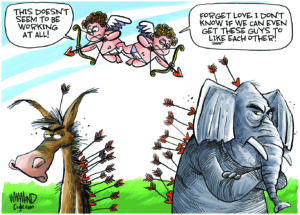Health Care Bill Watch 2010: Left Frustrated, Right Readies Attack
Things were getting snippy on both sides of the aisle Thursday as Congress prepared for the next -- and oh please, let it be the final -- showdown over health care reform Take, for example, the words of Republican Rep Mike Pence, who told a tea-party-friendly crowd this week (continued) .
Things were getting snippy on both sides of the aisle Thursday as Congress prepared for the next — and oh please, let it be the final — showdown over health care reform. Take, for example, the words of Republican Rep. Mike Pence, who told a tea-party-friendly crowd this week that the Democrats’ plan “tramples on the Constitution.” Uh oh! Another, bigger figure from among the GOP’s ranks, Rep. John Boehner, called the bill a “job killing monstrosity” on his website.
Meanwhile, House Speaker Nancy Pelosi wasn’t about to take that kind of talk sitting down, firing back on Thursday: “There is no limit to what the other side will do to protect the insurance companies.” And, as The Washington Post noted that same day, although Rep. Dennis Kucinich decided to back the bill, card-carrying communist Michael Moore (just kidding!) is clearly not impressed with the latest turn of events, as he put it succinctly: “[T]his is not health-care reform; the bill is a joke.”
Well, joke or no, the bill’s backers are currently working the angle that, although the legislation would carry a $940 billion price tag, the plan would do wonders for the federal deficit over the next decade. –KA
Your support matters…The Washington Post:
The program would be paid for by slicing nearly $500 billion from Medicare and other federal health programs, particularly a privately operated insurance plan known as Medicare Advantage. Democrats also propose taxing, for the first time, the health benefits of some people who receive coverage through employers. That proposal focuses on the most generous policies, which economists say are helping to drive health-care costs skyward.
The bill — unveiled Thursday and likely voted on Sunday in the House — also would increase Medicare payroll taxes for wealthy families, in part by applying the tax for the first time to investment income.
The cost of expanding coverage would exceed $200 billion a year by 2019, the CBO said. But new revenue in the package, combined with savings from program cuts, would outpace the cost of coverage, reducing the federal deficit by $138 billion over the next 10 years. The savings would continue to accumulate in the decade thereafter, the CBO said, eventually slicing around $1.2 trillion from the nation’s budget gap.
Independent journalism is under threat and overshadowed by heavily funded mainstream media.
You can help level the playing field. Become a member.
Your tax-deductible contribution keeps us digging beneath the headlines to give you thought-provoking, investigative reporting and analysis that unearths what's really happening- without compromise.
Give today to support our courageous, independent journalists.






You need to be a supporter to comment.
There are currently no responses to this article.
Be the first to respond.